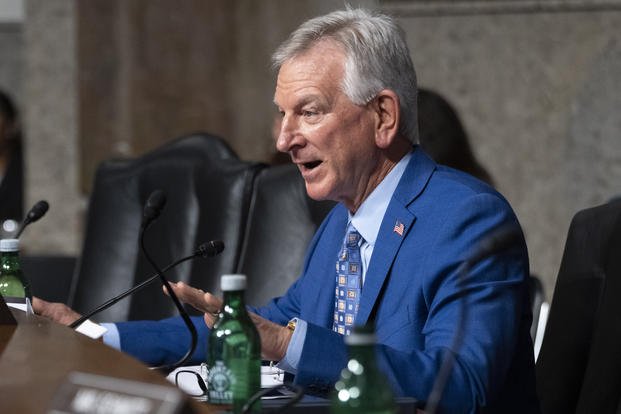
More than 400 senior military officers were promoted Tuesday following months of delay after Sen. Tommy Tuberville, R-Ala., ended his blockade on military confirmations without winning any change to the Pentagon abortion policy he was protesting.
Tuberville announced Tuesday afternoon he was dropping his procedural hold on military confirmations on all but those nominated to be four-star generals and admirals. Hours later, Senate Majority Leader Chuck Schumer, D-N.Y., went on the Senate floor to confirm the unblocked officers.
"I hope no one does this again," Schumer said. "And I hope they learn the lesson Sen. Tuberville did, and that is: He held out for many, many months, hurt our national security, caused discombobulation to so many military families who have been so dedicated to our country, and didn't get anything that he wanted."
Read Next: Rescue Turns to Recovery as More Crew Members in Deadliest Air Force Osprey Crash Are Identified[1]
While Tuberville’s new position still leaves at least 11 officers in limbo, the vast majority of the officers whose promotions had stalled because of him were able to move forward.
"We didn't get the win that we wanted," Tuberville acknowledged as he announced he was largely backing down. "We've still got a bad policy. We tried to stand up for the taxpayers of this country."
In late February, Tuberville announced he was placing what's known as a hold on all general and flag officers nominees in an effort to pressure the Pentagon to reverse its policy of covering travel and leave for service members who seek abortions.
While a hold cannot prevent the Senate from confirming nominees, it requires the chamber to take individual roll-call votes on each nominee rather than quickly confirming them in batches in a voice vote as it typically does for noncontroversial military promotions -- effectively grinding the military promotions process to a halt.
Tuberville's hold gradually ballooned to cover more than 450 officers. For months, he refused to relent despite arguments from Democrats, some Republicans, Pentagon officials and military families that he was harming national security and punishing military families for a policy they had no control over.
But as it became increasingly clear that enough of his Republican Senate colleagues would allow a Democratic effort to circumvent him to succeed, Tuberville reversed course.
His new stance will allow one-, two- and three-star generals and admirals to be promoted under the fast-track Senate procedures typically used for military nominees.
He said he is keeping the hold on four-stars because they "need to be vetted just like everybody else."
The Pentagon welcomed Tuberville's decision, but continued to encourage him to allow quick confirmation of the four-star nominees as well. Among those whose promotions are still delayed are the nominees to be vice chiefs of the Army[2], Navy[3], Air Force[4] and Space Force[5], and the commanders of Northern Command, Cyber Command, Space Command, Pacific Fleet, Pacific Air Forces and Air Combat Command.
"Clearly vital and critical organizations, all of which require experienced senior leaders in those positions," Pentagon press secretary Brig. Gen. Pat Ryder told reporters in a public briefing Tuesday.
Military families also expressed relief that their ordeal of waiting for spouses[6]' promotions would soon be over.
"The heroes of today's news are the thousands of everyday military family members who stood up and said, 'Enough!' when a single senator decided to bully our community," Sarah Streyder, executive director of the Secure Families Initiative, which petitioned the Senate[7] to end the holds, said in a statement. "We greet today's announcement with relief and tremendous pride in our SFI members for making a difference."
Before the end of the month, Democrats were planning to sidestep Tuberville's hold by essentially temporarily changing Senate rules to allow most of the nominees to be confirmed in a single vote. The rules change wouldn't have applied to members of the Joint Chiefs of Staff and combatant commanders, putting the Senate in a similar place as it is now that Tuberville has backed down.
Also adding urgency to ending the standoff was the calendar. Military nominees who aren't confirmed by the end of the year would have had to be renominated, said Sen. Dan Sullivan, R-Alaska, who confronted Tuberville about the holds on the Senate floor and had not ruled out supporting the Democratic rules change.
"They go back to the Armed Services Committee to start the process over again," Sullivan told reporters just before Tuberville's announcement. "My prediction, if that happens, you will have dozens, if not hundreds of the best military officers not just in America, but in the world say, 'You know what? I'm out of here.'"
-- Konstantin Toropin contributed to this report.
Related: Democratic Plan to End Senate Blockade of Military Promotions Takes Critical Step Forward[8]
© Copyright 2023 Military.com. All rights reserved. This article may not be republished, rebroadcast, rewritten or otherwise distributed without written permission. To reprint or license this article or any content from Military.com, please submit your request here[9].